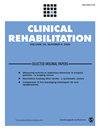Optokinetic stimulation in the rehabilitation of visually induced dizziness in people with vestibular disorders: A systematic review
IF 2.6
3区 医学
Q1 REHABILITATION
引用次数: 0
Abstract
ObjectiveThis systematic review and meta-analysis investigates the effects optokinetic stimulation in people with vestibular disorders, with a specific focus on people with visually induced dizziness.Data sourcesA systematic review was conducted using three electronic databases, CINAHL, PubMed and Physiotherapy Evidence Database (PEDro), from 2000 up to February 2024.Review methodsRandomised controlled trials were included, which compared: (a) adults above 18 years old with vestibular disorders, (b) the study evaluated interventions using optokinetic stimulation, (c) the intervention was compared with usual care; placebo or to no intervention, (d) the study included at least one outcome measure evaluating vestibular symptoms and (e) published in English. The methodological quality of the included studies was assessed using the PEDro scale and PROSPERO's registration number ID: CRD42021273382).ResultsEleven randomised control trials, reported in 12 records, fulfilled the inclusion criteria. All of the studies were considered to have ‘good’ methodological quality according to the PEDro scale. All studies showed significant improvement in vestibular symptoms in both the intervention and control groups. A meta-analysis performed on six of the records found a preference towards the addition of OKS to conventional vestibular rehabilitation helped to further reduce dizziness symptoms for patients, but the results were not statistically significant.ConclusionNo optimal duration or frequency for OKS has been determined. The addition of OKS to conventional vestibular rehabilitation may be beneficial in further improving vestibular symptoms in patients with dizziness. OKS could help to improve enjoyment and adherence to vestibular rehabilitation.光动力刺激在前庭功能障碍患者视觉引起的头晕康复中的应用:系统综述
本系统综述和荟萃分析研究了光动力刺激对前庭功能障碍患者的影响,尤其关注视觉引起的头晕患者。数据来源利用 CINAHL、PubMed 和物理治疗证据数据库 (PEDro) 这三个电子数据库进行了系统综述,时间跨度从 2000 年至 2024 年 2 月。综述方法纳入了随机对照试验,这些试验对以下人群进行了比较:(a) 18 岁以上患有前庭功能障碍的成年人;(b) 研究评估了使用光动力刺激的干预措施;(c) 将干预措施与常规护理、安慰剂或无干预措施进行了比较;(d) 研究至少包括一项评估前庭症状的结果测量;(e) 以英语发表。纳入研究的方法学质量采用 PEDro 量表和 PROSPERO 注册编号 ID 进行评估:结果符合纳入标准的随机对照试验有 7 项,共 12 条记录。根据 PEDro 评分标准,所有研究的方法学质量均为 "良好"。所有研究均显示,干预组和对照组的前庭症状均有明显改善。对其中六项记录进行的荟萃分析发现,在常规前庭康复治疗的基础上增加 OKS 有助于进一步减轻患者的头晕症状,但结果并不具有统计学意义。在常规前庭康复治疗的基础上增加 OKS,可能有助于进一步改善头晕患者的前庭症状。前庭康复训练有助于提高前庭康复训练的趣味性和坚持性。
本文章由计算机程序翻译,如有差异,请以英文原文为准。
求助全文
约1分钟内获得全文
求助全文
来源期刊

Clinical Rehabilitation
医学-康复医学
CiteScore
5.60
自引率
6.70%
发文量
117
审稿时长
4-8 weeks
期刊介绍:
Clinical Rehabilitation covering the whole field of disability and rehabilitation, this peer-reviewed journal publishes research and discussion articles and acts as a forum for the international dissemination and exchange of information amongst the large number of professionals involved in rehabilitation. This journal is a member of the Committee on Publication Ethics (COPE)
 求助内容:
求助内容: 应助结果提醒方式:
应助结果提醒方式:


